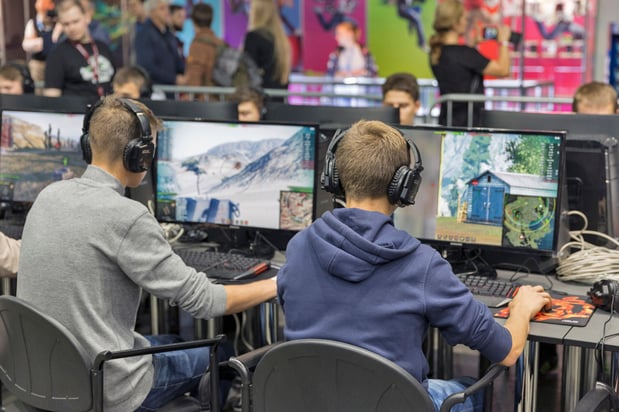You’ve likely heard of Mario, Zelda, FIFA and most recently Fortnight. There are games to to race, games to score, games to build, games to kill and games that tell stories.
All of these video games share one thing: a goal. Whether they have levels, tasks, or goal posts to fill, each game eggs a player on to play from the title sequence to the end credits. Getting tasks done motivates us with a hit of dopamine, pushing us biologically to stay up for long hours, clicking buttons and ignoring our responsibilities and muscle atrophy.
Game Over means try again.
Gaming Disorder as a Disease
As of 2018, the World Health Organization (WHO) includes obsessive gaming in their 2018 International Classification of Diseases (ICD).
The WHO refers to this condition as “gaming disorder” and hopes the new classification will increase awareness among society, health care providers, and families regarding the consequences of compulsive video gaming.
In an interview with CBS News, the Director of the WHO Department for Mental Health and Substance Abuse, Dr. Shekhar Saxena, cited "the need and the demand for treatment in many parts of the world."
How to Define and Diagnose Gaming Disorder
Gaming disorder is diagnosed “when a person's habit is of sufficient severity to result in significant impairment in personal, family, social, educational, occupational or other important areas of functioning," according to a tentative draft of the new policy.
Specifically, the definition of gaming disorder by the WHO is as follows:
- A pattern of persistent or recurrent behavior of digital video-gaming, either online or offline
- Impaired control over gaming activity
- When gaming takes precedence over other life interests and daily activities
- The continuation or escalation of gaming despite the occurrence of negative consequences
As the popularity of video games increases, so does the concern for mental health:
- More than 150 million Americans play video games
- 60 percent of Americans play daily
- 70 percent of parents say video games are a part of their child’s life
- An Oxford study found 2% to 3% of surveyed gamers showed symptoms of being addicted
- A recent poll found that 10% of surveyed gamers admitted to playing for 12 to 24 hours without interruption.
Similarities between Gaming and Substance Abuse Disorders
The main characteristics of excessive gaming activity are similar to the features of substance and gambling disorders. Internet gaming addiction is associated with the same neurocircuitry, molecular and behavioral changes, according to a published review.
Just as dopamine affects the addictive brain of substance abusers, so it does to game players. As mentioned, finishing goals within the game and receiving points or bonuses bring a feeling of euphoria to the player. The brain may begin to associate gaming with increased dopamine levels, making it difficult for a person to stop the compulsive behavior. Also similar to the dopamine increase in substance abuse, the increase during gaming is temporary, and the gamer develops a tolerance to it. Over time, the addict needs more of the rewarding substance ro activity to reach the same “high.”
The Dangers of Gaming Addiction
Not everyone thinks that video gaming is a harmful or addictive activity. Many believe that video games expand the imagination, give children the opportunity to work collaboratively, and sharpen cognitive skills.
Yet, when young people spend a majority of their free time playing digital games at the expense of schoolwork, physical exercise, or social activities, the benefits of gaming should set off alarm bells. As an addiction, compulsive video-game playing has the risk of negatively affecting connections to family, friends, work and much more.
Psychiatrists are especially concerned about the well-being of children and gaming addiction for several reasons:
- Studies reveal that excess gaming results in poorer schoolwork and poor impulse control
- Kids who spend a huge amount of time with video games may fail to develop friendships
- Gaming allows for avoidance of developmental skills, such as confronting painful emotions and awkward social experiences
- Children who habitually engage in excess gaming often fail to obtain appropriate outdoor exercise
- Exposure to video game violence may increase signs of aggression
- At any age, there may be at higher risks of behavioral and mental health problems
The Link Between Video Games and Mental Health Disorders
Evidence shows excessive gamers may have mental health issues, including higher levels of anxiety, depression, and low self-esteem.
The compulsive behavior of digital gaming has also been used as an escape from real-life problems. In this way, video-gaming has several characteristics in common with most other addictions:
- If the person cannot engage in the behavior, they become irritable and agitated
- The individual needs more and more of the behavior to keep him going
- The person is willing to lie to friends and family to conceal the addiction
- There are withdrawal symptoms upon cessation, such as anxiety, aggression, or craving
With the increased knowledge of these conditions being linked to suicidal tendencies, the WHO believes that being proactive to the risks of excess gaming is critical.
Next Steps
With gaming disorder only just being recognized, only time will tell how many gamers already meet its criteria. However, there’s already a digital wellness movement working on creating apps and tools that allow users to monitor and reduce their screen time.
Facebook, Apple, and other tech giants recognize the need for vigilance and are focusing on of this preventive aspect of screen time. They have begun to incorporate self-imposed methods for users to limit their time gaming and to be more mindful of screen usage.
With the classification of gaming disorder by the WHO, hopefully healthcare professionals, family, and friends will be more alert to this condition and seek out appropriate help for their loved ones.
If you or someone you know is struggling with addiction, you can explore our directory of rehabilitation facilities or call 800-772-8219 to speak with a treatment specialist.





